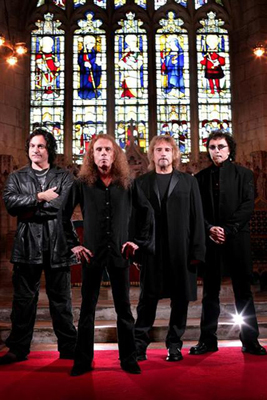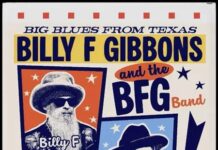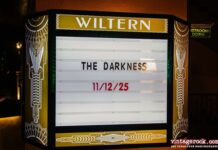Review by Shawn Perry
Going in, I pretty much knew what to expect: gloomy, doomy, ominous, and darkness rolling in a slathering of slick metallic riffs, commanding vocals and a sludgy bottom end. Heaven and Hell — featuring original Black Sabbath guitarist Tony Iommi and bassist Geezer Butler, along with Sabbath’s second vocalist Ronnie James Dio and drummer Vinny Appice — have been going strong for two years. Reeling with ideas after a series of reunion shows, they recorded The Devil You Know, their first new album together in 17 years. The debut album of Heaven & Hell and the tour behind it, marks a new beginning for a band that’s apparently here to stay.
For the third show of their 2009 U.S. tour, Heaven and Hell set up shop at the Greek Theatre, high above the smog of L.A. I passed on last year’s Metal Masters show with Judas Priest and barely saw half their set at Irvine in 2007, so the Greek would serve my desire to see the band in all its might and splendor. For me, seeing Tony Iommi live and up close is always a treat. He’s changed from the reticent, in-the-shadows guitarist of the 70s into more of a steady commander of a ship, peeling off stinging leads without losing his cool.
With great surprise, they opened with “The Mob Rules,” a song that Iommi transformed into a fret folly. Having caught the Mob Rules tour in 1982, the song captured my attention by its rollicking sequence of push n’ pull attacks. Of course, the problem I had with the song and the album back then was that it wasn’t as strong as Heaven And Hell, the first album Dio did with Black Sabbath. Hearing it now, however, in the context of a group with a checkered history, I couldn’t imagine a better opener.
Dio, the ever-so proper host, politely thanked the audience, exclaiming that it was “good to be home.” Then he introduced a song he says was the very first one they wrote together: “Children Of The Sea.” The singer, who turned 67 in July, can still radiate a magical presence as he turns over a melodic phrase with the greatest of ease. It would be nice if he and the band could lighten up on all the morose imagery once in a while, but I suppose that would spoil the whole broth for a following weaned on wails of fear and fright.
Then it was on to “I,” from 1992’s Dehumanizer, the band’s third album. Not overly convinced this album nor the song were, again at that time, good enough, it becomes apparent that it has prospered with age. The riff rises up on the cusp of that classic “Into The Void” staccato, before the plodding rhythm set down by Butler and Appice gives way, and Iommi delivers a clean, brisk lead and Dio steps forward, imploring the audience to join in on “I, I, I, I…”
The dynamic between Iommi, Dio and Butler is one of distance and respect. When I first saw Dio with Rainbow in 1976, he would exit quickly between breaks to allow Ritchie Blackmore the space he required. As a solo artist, of course, Dio’s always out in front and rowing the boat. But with the Sabbath boys, everyone’s an equal player. Butler slaps away recklessly at his bass on one side of the stage, somehow hitting all the right notes. Vinny Appice sits high up in the back, drums of all sizes surround him — overhead, to the left, to the right, in front, behind… it’s a drum circle and Appice is smack dab in the middle.
Iommi occupies stage left (right if you’re sitting in the audience), a wall of Laney amplifiers providing the unmistaken bone-crushing chords that defined a genre. Dio sort of glides around in the middle, balancing the edge on occasion, but playing it safe and sound for the most part, flashing devil horns and keeping the crowd on its feet.
Now that the history lesson was over, it was time for Heaven and Hell to lay down a new foundation. “Bible Black” was introduced and its mystical lock entranced the audience. Good thing too because the overhead video, with its Medusa meets the Devil images, fell into a monotonous loop that did little to add to the music. “Time Machine,” another winner from Dehumanizer, redeemed the momentum before a pointless drum solo from Appice sent everyone packing to the bathroom or bar.
It didn’t last long and things picked up marginally. The dripping notes of “Falling Off The Edge Of The World,” a bold and brassy number from Mob Rules, seemed to align perfectly with another new one, “Follow The Tears.” The demonic and winged wombats guarding each side of the stage could have emerged from their stupor at any moment. Instead, they haunted the sky and remained motionless. The most logical choices started to narrow down (the possibility of hearing any pre-Dio Sabbath classics nil), and “Die Young” unexpectedly launched it assault on an unsuspecting mob.
After Iommi’s solo sequence, Heaven And Hell played what could now be called their theme song, “Heaven And Hell” — nothing remotely like your garden variety theme song. Tonight at the Greek, one thing was for sure: it was audience participation time. They not only sang the chorus of “Heaven And Hell” at Dio’s urging; they also sang the main riff well into the night as blasts of smoke brought the main set to a close.
As could only be expected and hoped for, the encore featured a piping hot version of “Neon Knights,” arguably the group’s best number. I looked down in admiration at the frontline — musicians I’ve seen many times before, playing with others as well with one another. This combination seems the most natural.
Ozzy Osbourne has become too animated for another Black Sabbath reunion. He reportedly won’t submit to the idea of making new music with Sabbath. So why not work with Dio under a different name and build something new with a ready-made following. We’d be lucky if these guys could give us another five years, so it makes even more sense that they make another record or two and escape with their lives and legends unscathed. And swing by the Greek for another round of metal for the malignantly maligned and mutilated — a mixed bag of young and old with a shared love of Black Sabbath and its offspring.
Coheed And Cambria, a unique 70s style hard rock and metal band, opened the show. It had been a while since I had been treated to a chorus of talkbox, theremin, and feedback, plus enough hair on lead singer Claudio Sanchez’s head to shade the natives. They might have a shot if enough people wake up to the fact that good metal doesn’t have to be drowning in counter-melody and distortion.




















